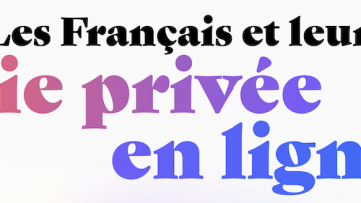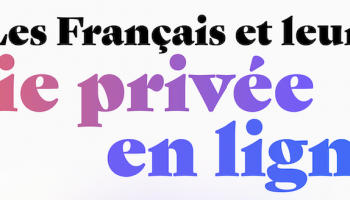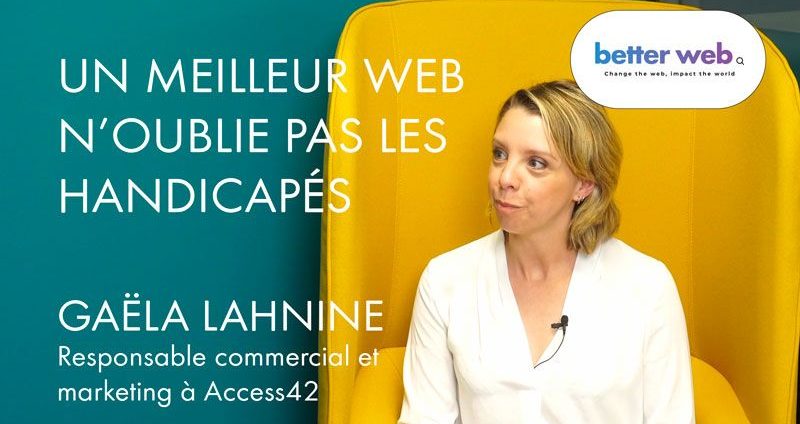


For this new episode #BetterWeb, we are pleased to welcome Gaëla Lahnine, Sales and Marketing Manager of Access 42, who supports companies and administrations in the implementation and monitoring of their web accessibility policy.
At Qwant, we are proud to support all ideas and initiatives that contribute to the improvement of the web. This is the objective of this blog and this video interview format entitled #BetterWeb that we offer you!
At Access42, about fifteen people work to promote digital accessibility and thus support many organizations and companies in their compliance. Unfortunately, little is known but there is a legal obligation to make websites accessible.
#BetterWeb is a program of Qwant, the search engine that respects your privacy.
Subscribe to our YouTube channel to be informed of our upcoming videos 🙌
👉 Betterweb: https://betterweb.qwant.com/
Follow Qwant on social networks:
• Twitter: https://twitter.com/Qwant_FR
• Instagram: https://www.instagram.com/qwantcom/
• LinkedIn: https://www.linkedin.com/company/qwant
• Facebook: https://www.facebook.com/Qwantcom
Transcript
00:00:00 – Sébastien : Gaëla Lahnine, hello
00:00:02 – Gaëla: Hello
00:00:03 – Sébastien : Can you introduce yourself in a few words, a few lines?
00:00:06 – Gaëla: So thank you for the invitation already. So, my name is Gaëla Lahnine, I’m the sales and marketing manager for Access 42. Access 42 is a cooperative that specializes in digital accessibility and is recognized by the State as a solidarity enterprise of social utility.
00:00:24 – Sébastien: Where does the name Access 42 come from?
00:00:26 – Gaëla: Access for accessibility, you guessed it. and 42. So here, we are on a reference for geeks, the number 42 is the answer to all questions. It’s a little nod to The Hitchhiker’s Guide to the Galaxy.
00:00:43 – Sébastien : Can you introduce us to your organization? 00:00:46 – Gaëla: Yes. So, at Access 42, there are fifteen of us. Plus a guide dog. So, we have experts in digital accessibility who have, for some, more than twenty years of experience in the field. And before consulting, most of us worked at the advertiser, freelance, so know the field well.
00:01:07 – Sébastien: But what is digital accessibility?
00:01:10 – Gaëla: So, digital accessibility quite simply, it is the fact of being able to access digital for people with disabilities. So it is a fundamental right. It is the right of persons with disabilities to access information. The United Nations initiated the Convention on the Rights of Persons with Disabilities. A convention that was signed and ratified by the France and which established the essential principle that every society has the duty to meet the needs of persons with disabilities, simply in the name of fundamental human rights.
00:01:47 – Sebastien: I guess you only have a captive, interested and proactive audience. Or do you also have people who are completely reluctant to all this?
00:01:57 – Gaëla: Today, it is true that there is still a lot of reluctance or ignorance about accessibility. There is already a real lack of knowledge of legal obligations today. Normally, all public sites should be accessible. This is far from being the case. All private companies, which make more than 250 million in annual turnover should have accessible sites. The observation is the same, we are still far from it. So, it is true that there is this ignorance.
There is also the fact that there is a cruel lack of training in digital accessibility is not a new concept. However, it is true that it is still a notion that is too little addressed in initial training for digital professions.
And then there is a question of priority. It is true that you were talking to me about constraints. Many people still see accessibility only as a constraint, an expense that for them would not be justified or would have no reason to exist. How can a company today say that it does not have customers or that it does not talk to people with disabilities and therefore does not need digital accessibility?
Today in France, one in six people is disabled, that represents 12 million people and it should be noted that it is estimated that 80% of disabilities are invisible. So the impact of digital accessibility is totally underestimated today, you’re right.
00:03:32 – Sébastien : And what are we if we are concrete, on the Internet, because we imagine that the Internet is finally accessible everywhere and by all. But what are the situations of disability that prevent access to the Internet today?
00:03:48 – Gaëla: First of all, we will have to differentiate the impairment from the disability situation. Not every deficiency will necessarily lead to a digital disability. If I take the example of a paraplegic person who is in a wheelchair, if he does not have a sensory disability, he may not be in a situation of disability vis-à-vis digital. We must differentiate between these two concepts and digital accessibility will really meet the needs of more than several large families of disabled situations.
There are all the visual disabilities, so it’s easy to imagine, a blind person won’t see the videos. It will therefore be necessary to describe it through alternatives. A person who is visually impaired may need to reinforce contrasts or enlarge characters.
There are also hearing disabilities. A deaf person will not be able to hear the sound of the videos. So, here too, it will be necessary that the video and subtitles and a transcript to describe all the audio elements and for motor disabilities, some motor disabilities may also have specific needs in relation to accessibility. We can think of a person who has certain restrictions, perhaps at the level of the hand, and who will not be able to use his mouse to navigate. So, this person will have to navigate totally on the keyboard, on the keyboard for that matter, whether physical or virtual, thanks to a contactor.
And then there is also the family of mental disabilities. Mental disabilities, we speak, we include intellectual, psychic and cognitive disabilities. So here too, a person who would suffer from a cognitive disability. So a dys disorder, for example dyslexia, might need to enlarge the characters or change the font. And someone with an intellectual disability or memory or reading impairment might need to master their environment on the Internet. By this I mean maybe being able to stop when there is content that is in animation, to be able to stop a video, to be able to stop a carousel and could need explanations also to fill out a form. Master your environment to have time to understand the information.
So it’s true, that there are many different situations. It is difficult to be exhaustive. Each additional person is different, even in the same category of disability. What must be remembered is that ultimately, it is the lack of adaptation that will create the disability situation and not the impairment. Depending on the country, the situations are different, the regulatory contexts may also be different. If we take the case of the United States, there are many lawsuits from users with disabilities which, somewhere, also advances accessibility faster.
00:06:51 – Sébastien : But isn’t it ultimately in the image, doesn’t it happen online, what happens in real life? That is to say that there are countries like the United States where there is indeed a consideration everywhere, at all times, of all people with disabilities, public transport, sidewalks, restaurants, cinemas, places of life, public services. Finally, is the gap that can be found online between the United States and Europe, is it not the same gap that we are witnessing in the street?
00:07:26 – Gaëla: Yes completely. And it is true that there is this difference between physical accessibility which, which began to be dealt with a little earlier, digital accessibility. After the regulatory framework, it is also evolving. And so, it is true that we see that the consideration of accessibility is beginning to be done more and more. And you should know that there, there is a European directive, also goods and services that, for once, will really integrate accessibility as a whole and which should be transposed into France in 2022 to have entered into force in 2025. So accessibility is really going to become a central issue.
00:08:02 – Sébastien: Are there off-the-shelf technologies that can be taken and used to facilitate accessibility on the Internet?
00:08:12 – Gaëla: So, I would like to tell you that there is a technology that makes content accessible like that on the Internet. But the magic wand doesn’t really exist. For content to be accessible, what is important is how to design and develop its products and services. Accessibility criteria must be met in order to have accessible content.
00:08:41 – Sébastien : In the famous grandes écoles called digital in France and beyond, do we train our young technological shoots to this concern?
00:08:54 – Gaëla: It is still a notion that is too little addressed, indeed, in initial training for digital professions. Unfortunately.
00:09:01 – Sébastien: You participated in the drafting of the State’s digital accessibility repository. What is, as you told us, obviously, the framework will evolve. But today, what is the state of this legal framework?
00:09:16 – Gaëla: The entry point was the 2005 law for equal rights and opportunities for people with disabilities. The limitation of this law was the fact that it concerned only the public. The scope was expanded with an update of the law in 2016 to certain private companies. But here too, the problem was that these laws took time to be transposed into decrees. And it was not until July 2019 that this decree was finally published.
00:09:50 – Sebastian: 14 years old?!
00:09:51 – Gaëla: 2005, there were updates to the law in 2016, one in 2018 and after that, we had to wait until 2019. This is also why accessibility has been slow to progress in France.
00:10:03 – Sébastien: Very clearly, we are a public or private company. We do not really know how to do it We understand that the law has evolved and it will evolve again. Can I use Access 42 if I need help?
00:10:19 – Gaëla: Absolutely! We at Access 42, we will accompany you precisely in your accessibility approach. We’ll help you make your sites and apps accessible. We will audit them, see what is the problem. This is not consistent today in terms of accessibility. Provide you with corrective recommendations. Assist you in the implementation of these fixes. And to maintain accessibility also in the long term, since these audits and corrections will make it possible to achieve this regulatory objective of compliance
00:11:02 – Sébastien: This “compliance”?
00:11:04 – Gaëla: That’s it, but accessibility is something that comes to play in the long term. Doing audits from time to time is not going to be enough. The people who work on the product, on the digital service, really need to be trained in accessibility to take it into account in their daily actions.
00:11:24 – Sebastian: So, you told us, you did not name those who are reluctant to changes and evolutions expected, useful, servicially useful. But have you ever had good surprises from a public site, particularly virtuous, effective, that works and is totally accessible? Do you have any examples to give us?
00:11:47 – Gaëla: You have the monparcourshandicap.gouv.fr site which by its objective wanted to be exemplary on digital accessibility too and which is a good example in the consideration of accessibility in the development of its site.
00:12:04 – Sébastien: What if I ask you to name me a private actor? Is there a private actor that has digital tools that are “full” accessible for people with disabilities?
00:12:14 – Gaëla: So, they are working on it. That way, today, which is 100% accessible, I do not see any examples to give you, unfortunately.